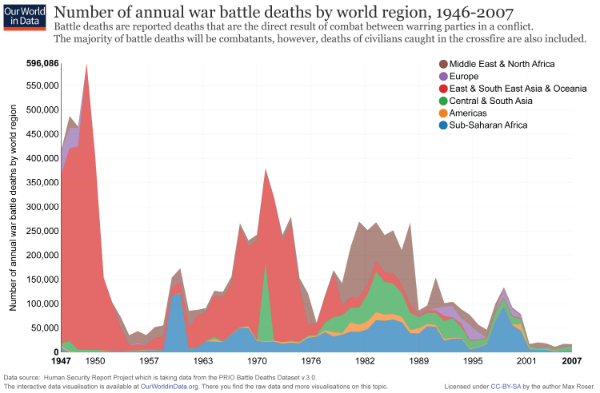Why you should always cast a suspicious eye on American power
When in doubt, call for more oversight


A free daily email with the biggest news stories of the day – and the best features from TheWeek.com
You are now subscribed
Your newsletter sign-up was successful
Over the weekend Daniel Drezner, professor at Tufts University and writer for The Washington Post, got into an interesting debate with a number of leftists on Twitter. The question at issue was worldwide American military hegemony: Is it good or bad? Drezner took the "good" position, while Adam Johnson of Alternet took the contrary view.
Both sides make some pretty good points. But regardless of one's position on the American empire, anyone in Drezner's position must recognize a basic duty to keep a suspicious eye on government activity — especially when it involves the use of force.
First, let's run through the basic argument. Leftists point to various thefts, acts of bullying, overthrowing of sovereign governments, and other humanitarian cataclysms caused by United States intervention as evidence that America's world influence is bad. This includes instances in Mexico, the Philippines, Indonesia, Cuba, Vietnam, Cambodia, Iran, Guatemala, The Democratic Republic of the Congo, Nicaragua, Chile, Afghanistan, Iraq, Libya, and Yemen. Aside from those specific examples, leftists typically add the noxious worldwide effect of the U.S.-led war on drugs, and the disastrous effects of U.S.-led neoliberal reforms in Eastern Europe after the end of the Soviet Union. That's not the whole case, but it's the major points.
The Week
Escape your echo chamber. Get the facts behind the news, plus analysis from multiple perspectives.

Sign up for The Week's Free Newsletters
From our morning news briefing to a weekly Good News Newsletter, get the best of The Week delivered directly to your inbox.
From our morning news briefing to a weekly Good News Newsletter, get the best of The Week delivered directly to your inbox.
In response, defenders of American empire point to various counter-examples. Extremely heavy U.S. intervention seemed to work out fairly well for Japan, South Korea, and Germany. Western Europe in particular seems better off under the U.S. security umbrella than at any time in known history. The border between Germany and France was one of the most violent places in the world for centuries; the fact that there hasn't been a major war there for over 70 years now is surely worth something. Overall, the imperial case is summarized by the following chart:

As in any debate about historical moral virtue, the counterfactual question is hard to avoid. Would the world been better off with a different hegemon? How much of the above reduction in violent conflict can be assigned to U.S. governance, and how much to general development of different moral codes across the world, or something else? (Personally, I'd assign virtually all the responsibility for the near-end of open war between great powers to nuclear weapons.) America could have done much better, no question, but it also could have done worse — just look at the devastation wrought by the Soviet Union, or the United Kingdom, the previous world hegemon.
We could go around and around all day trying to litigate this question. But while that would be interesting, I think agreement is more likely if we consider the value of oversight and criticism.
A free daily email with the biggest news stories of the day – and the best features from TheWeek.com
The problem I have with a Drezner-style perspective (his most recent book is called The System Worked: How the World Stopped another Great Depression) is that it often seems more about identifying with and defending the U.S. power structure rather than ensuring that it is as just as possible. Someone with these views will tend to take criticism of fumble-fingered American imperialism as a sort of personal attack. As Josh Marshall put it describing the Chelsea Manning leak story: "[I]f you basically identify with the country and the state, then indiscriminate leaks like this are purely destructive. They're attacks on something you fundamentally believe in, identify with, think is working on your behalf."
Because whatever good there is in U.S. imperial hegemony, surely the quickest way that it could be destroyed would be for the security apparatus to operate with zero oversight or accountability. Say the U.S. were to start a war of aggression on false pretenses, or its intelligence agency were to commit war crimes and then destroy evidence of them, and then attempt to intimidate the Senate oversight committee writing a report on said crimes, or a top-level general were to get a sweetheart bargain after getting caught leaking code word documents to his mistress, that would not bode well for the intelligent and restrained use of military force.
Of the many strategic disasters created by overseas American meddling, it seems to me that a large fraction can be chalked up to sheer incompetence, particularly recently. Though a few military contractors did well out of the invasion of Iraq, the U.S. as a whole was severely harmed, with multiple trillions flushed down the toilet, thousands of soldiers killed, and tens of thousands physically or psychologically maimed. And today no U.S. company has taken root in the shattered hulk of the Iraqi state — heck, even Iraqi oil is barely needed on world markets. As a Foreign Policy blogger wrote several years ago: "The last time I trusted intelligence bureaucracies and political leaders that the system was working was the run-up to the Iraq war. Never again."
That someone was Daniel Drezner, as it happens. Whether or not he still agrees with that sentiment, it's a worthwhile one. The U.S., like some roided-up toddler, is immensely powerful yet manifestly unable to control that power consistently. Anyone with a voice ought to be working hard to make sure it doesn't tread on random countries by mistake.
Ryan Cooper is a national correspondent at TheWeek.com. His work has appeared in the Washington Monthly, The New Republic, and the Washington Post.
-
 Antonia Romeo and Whitehall’s women problem
Antonia Romeo and Whitehall’s women problemThe Explainer Before her appointment as cabinet secretary, commentators said hostile briefings and vetting concerns were evidence of ‘sexist, misogynistic culture’ in No. 10
-
 Local elections 2026: where are they and who is expected to win?
Local elections 2026: where are they and who is expected to win?The Explainer Labour is braced for heavy losses and U-turn on postponing some council elections hasn’t helped the party’s prospects
-
 6 of the world’s most accessible destinations
6 of the world’s most accessible destinationsThe Week Recommends Experience all of Berlin, Singapore and Sydney
-
 'Once the best in the Middle East,' Beirut hospital pleads for fuel as it faces shutdown
'Once the best in the Middle East,' Beirut hospital pleads for fuel as it faces shutdownSpeed Read
-
 Israeli airstrikes kill senior Hamas figures
Israeli airstrikes kill senior Hamas figuresSpeed Read
-
 An anti-vax conspiracy theory is apparently making anti-maskers consider masking up, social distancing
An anti-vax conspiracy theory is apparently making anti-maskers consider masking up, social distancingSpeed Read
-
 Fighting between Israel and Hamas intensifies, with dozens dead
Fighting between Israel and Hamas intensifies, with dozens deadSpeed Read
-
 United States shares 'serious concerns' with Israel over planned evictions
United States shares 'serious concerns' with Israel over planned evictionsSpeed Read
-
 Police raid in Rio de Janeiro favela leaves at least 25 dead
Police raid in Rio de Janeiro favela leaves at least 25 deadSpeed Read
-
 Derek Chauvin's attorney files motion for new trial
Derek Chauvin's attorney files motion for new trialSpeed Read
-
 At least 20 dead after Mexico City commuter train splits in overpass collapse
At least 20 dead after Mexico City commuter train splits in overpass collapseSpeed Read
